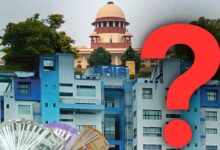West Bengal DA: Sixth Pay Commission Report Sparks Controversy Over Dearness Allowance

West Bengal DA: The controversy surrounding the West Bengal Sixth Pay Commission report and the dearness allowance (DA) for state government employees has taken a new turn. Following an order from Justice Amrita Sinha of the Calcutta High Court, the controversial report, which the state government had withheld for years, was finally made public. The report’s release has triggered significant outrage among state government employees and pensioners.
What is at the Core of the Controversy?
The heart of the dispute lies in a specific recommendation within the Sixth Pay Commission’s report concerning dearness allowance. In paragraph 12.4 of the report, led by Chairman Abhirup Sarkar, it is stated that the state government is not obligated to follow the All India Consumer Price Index (AICPI) for determining or increasing DA. This recommendation has caused a strong backlash among state government employees, as it introduces uncertainty into their future DA payments.
Questions Raised About Abhirup Sarkar’s Role
The report has also cast a shadow over the role of the Pay Commission’s chairman, Abhirup Sarkar. It has been reported that Mr. Sarkar, in his capacity as a professor at the Indian Statistical Institute, received his own salary and dearness allowance based on the AICPI. However, he recommended the opposite for state government employees. This apparent double standard has been heavily criticized by various employee unions and opposition parties, who allege that this recommendation was made to favor the state government.
Allegations Against the State Government
Several accusations have been leveled against the state government, including:
- Deliberate Delay in Releasing the Report: Although the report was submitted in September 2019, the state government did not make it public until a lawsuit was filed by Debaprasad Halder of the Unity Forum, leading to Justice Amrita Sinha’s order for its immediate release.
- Disregarding Court Orders: It is alleged that the state government has been dragging its feet in paying the outstanding DA, despite a Supreme Court directive on the matter.
- Lack of Cooperation with Employee Unions: Organizations like the Confederation of State Government Employees and the Sangrami Joutha Mancha have accused the government of ignoring their repeated requests for dialogue.
Action by Employee Organizations
Employee organizations have united to challenge the state government’s stance. They are preparing to file a contempt of court petition against the government for its failure to pay the outstanding DA. Moloy Mukherjee, the General Secretary of the Confederation, has stated that they will pursue legal avenues to ensure that employees receive their rightful dues.
Future Course of Action
The release of this controversial report has created a new storm in state politics. While state government employees are vocal in their demand for fair dearness allowance, the government is entangled in legal complexities. The future direction of this dispute remains to be seen, but it is clear that the employees are not willing to give up their fight for their rights easily.

